A Conversation With Randy Roberts
Roberts, co-author of "Blood Brothers: The Fatal Friendship Between Muhammad Ali and Malcolm X," the first book to examine the relationship between Ali and Malcolm, speaks with Allen Barra.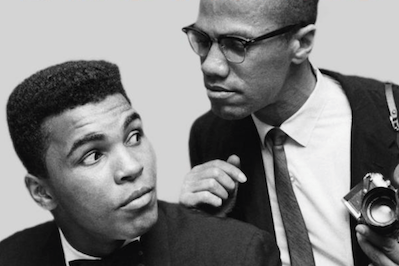
“Blood Brothers: The Fatal Friendship Between Muhammad Ali and Malcolm X,” by Randy Roberts and Johnny Smith, is the first book to examine the relationship between two of the most volatile lives in the most volatile era of 20th-century America. Truthdig’s Allen Barra talked to Roberts, distinguished professor of history at Purdue University, from the United States Military Academy, where he is teaching this winter.
To see long excerpts from “Blood Brothers” at Google Books, click here.
Allen Barra: First off: how do two historians write a book together? How is it possible to distinguish between your contributions to this book and professor Smith’s?
Randy Roberts: I’ve co-written almost as many books as I have written on my own, and I’ve enjoyed the experience. A mathematical oddity occurs when you co-write a book with the right partner. Suddenly one plus one equals three. Johnny and I pushed each other and, I believe, exceeded what either of us would have achieved alone. Teamwork in what is usually a solitary endeavor is a great thing.
As for distinguishing individual contributions, I think when co-authors are doing it right, readers should not be able to distinguish which author wrote the different parts of the book. Some chapters Johnny took the lead, and some I did, but others we split the primary writing. I think it helped us create a single voice.
AB: I remember reading about 26 years ago that Muhammad Ali was the most written-about human being who had ever lived. I don’t know if that’s true, but in the past year and a half alone, there’s been at least three books on him — “Bouts of Mania” by Richard Hoffer, “The Phantom Punch” by Rob Sneddon and now “Blood Brothers.” Yet yours is the first book in what must be at least a couple of hundred about Ali that delves into his relationship with Malcolm X. Why do you think that is?
RR: I recall reading exactly the same thing, and thinking, “No way, there can’t have been more written about Muhammad Ali than Lincoln or Napoleon or Jesus. And who came up with that statistic?” But who knows. Ali was and still is more of a world figure during his lifetime than the others, and they had shorter careers.
[Our book on] Ali’s relationship with Malcolm X resulted from our interest in how Cassius Clay became Muhammad Ali; that is, how he discovered his political voice. He was a fighter, not an intellectual; an athlete, not a reader. But sometime between the ages of 18 and 22, he developed a mature Black Nationalist ideology. How? The answer led to Malcolm, and that entailed understanding who Malcolm really was, what his goals were and how he thought Cassius fit into that agenda. We realized that Malcolm and Ali played critical roles in each other’s lives.
AB: You write in your preface, “Recognizing [Cassius] Clay’s global fame, Malcolm exploited him, envisioning a new movement that fused together Clay’s world and his into one built around celebrity and politics.” How personal do you think Malcolm’s feelings for Ali were, or was his interest in Ali primarily in exploiting him?
RR: That’s a fascinating question, a crucial question, one that is not fully answered in any source. But every historian at one point or another wanders into the realm of speculation based on the totality of his or her sources. So here goes. Malcolm X was one of the most single-mindedly political people I have ever encountered. He wasn’t as ruthless as Lenin or Mao, but like them, he was a revolutionary, committed to a Black Nationalist agenda. I think he genuinely liked Ali, might have even loved him, but what attracted him to the young boxer was what he saw in him. Almost immediately, I think, he understood how Ali could fit into his own political plans. Was he willing to exploit Ali? Sure. But that’s in the fundamental nature of any revolutionary.
AB: You also say, “More than anyone else, Malcolm molded Cassius Clay into Muhammad Ali.” That seems like a very broad statement. Can you give me a specific way in which that is true?
RR: Sure. The night after the Clay-Liston fight, Malcolm told Cassius that it was now time to become more serious, time to put away his “Louisville Lip” act. Sure enough, when Cassius met the press the next morning he was quiet and subdued and political. Sounding just like Malcolm X—in fact, using the very words of Malcolm X—he told reporters that he was a member of the Nation of Islam, and days later announced that his new name was Cassius X.
Furthermore, Malcolm led Clay/Ali to think in global terms about Black Nationalism and black independence. Such thinking was insignificant with Elijah Muhammad and the Nation. Malcolm was the one who introduced Cassius X to African diplomats and encouraged him to travel to Africa and the Middle East. It was those connections, that pattern of thinking, which pulled him away from Elijah, and led him on the path to becoming the “king of the world.”AB: Muhammad Ali famously said, “When you want to talk about who made me, you talk to me. Who made me is me.” Does that clash with your contention that Malcolm was the primary molder of Muhammad Ali?
RR: Of course, he was still Cassius Clay when he said that. And he had not even met Malcolm yet. If you talk about who made the “Louisville Lip,” his boxing persona that pulled boxing off the trash heap of sports, it was largely him. He came up with the act; he had an intuitive feel for what reporters and the public wanted. We discuss this at length in “Blood Brothers.” But Malcolm shaped Cassius X, and to a great degree, shaped Muhammad Ali — the mature Ali, the Ali who, at the end of his career and during retirement, followed the same path that Malcolm was following when assassins’ bullets cut him down. So even after his death, Malcolm helped shape Muhammad Ali.
AB: A strictly boxing question: To this day, many old-time boxing writers can’t believe that Cassius Clay defeated Sonny Liston in 1964. I realize now, looking back on that fight and reviewing Cassius Clay’s early career, that they had a right to be shocked. Clay had just turned 22, had fought only 19 fights, had been knocked down by a lightly regarded journeyman, Sonny Banks, and had been very nearly knocked out in London by British champion Henry Cooper. I won’t ask you how Clay beat Liston, but don’t you think that boxing writers had a right to be skeptical about the victory of so young and inexperienced a fighter versus so fearsome a fighter as Liston, who had won his previous two title fights in four minutes?
RR: Let’s talk boxing. A couple of points. First, although Clay had fought only 19 professional fights before taking on Liston, he had engaged in well over 100 amateur matches, some against very good international boxers. He had fought some big men and some heavy hitters. Angelo Dundee, his trainer, was one of the best in the business. In short, Clay was not inexperienced, and he had the confidence and outrageous advantages of youth. In addition, he was better against big slow heavyweights than smaller faster ones. Cooper was on the small side. So was Doug Jones, and for that matter, so was Joe Frazier. They gave Clay/Ali trouble.
Second, boxing people are hopelessly addicted to hype, none more so than reporters. As my friend Tom Hauser said, Mike Tyson couldn’t be beaten, until he was. Ronda Rousey couldn’t be defeated, until she was. Sonny Liston? He flattened fighters who came right at him, but had trouble with unorthodox styles. He was made for Clay/Ali. Of course, I’m great at predicting fights that have already taken place.
AB: After Muhammad Ali rejected Malcolm X in favor of Elijah Muhammad, Ali must have heard stories of Elijah’s transgressions and at least rumors of the brutality that Elijah’s followers used to keep dissenters in line. Is it possible that Ali feared revenge from the Nation of Islam if he broke off with Elijah? Would this have been particularly true after the murder of Malcolm X by radical followers of Elijah?
RR: This is a complex question, going to the heart of Ali’s beliefs and fears. He was attracted to Elijah Muhammad and the cosmology of the Nation of Islam. Talk of spaceships and blue-eyed devils and Armageddon appealed to him. It was the sort of talk that he had heard all his life from his father. And Malcolm had told him that Elijah was all-seeing and all-knowing. Now, had he heard about Elijah’s infidelities? Certainly. Did he know about the vengeance toward wayward members of the Nation? Yes, and he even supported it. He said, after all, “Malcolm X and anyone else who attacks or talks about attacking Elijah Muhammad will die.” His behavior toward his mentor during much of 1964 was brutally cold and unforgiving.
Did Ali come to fear for his personal safety? Probably. He made comments to his friend Sugar Ray Robinson and journalist Dave Kindred that suggested as much. Seeing what happened to Malcolm and others was enough to strike fear in any person. But Ali was not as politically and intellectually curious as Malcolm. Generally, he was comfortable with his role in the Nation.
AB: Malcolm X emerges from the pages of your book as more complex and charismatic than even Ali himself. At the time of his murder, he seemed to be evolving, becoming more open about relations between blacks and whites and more expansive in his ideas about being a Muslim. Would you venture a guess as to what he might have become had he lived? Might he have started a splinter group of Muslims who would have allied themselves with the integrationist policies of Martin Luther King?
RR: There is no doubt that Malcolm evolved. His trips to Africa and the Middle East, including a hajj to Mecca, had fundamentally changed his views about the Nation of Islam and Elijah Muhammad. He had begun to tone down—or at least qualify—his anti-white rhetoric and back away from some of the more extreme aspects of the Nation’s cosmology. And he had embraced Sunni Islam. But he remained an ardent Black Nationalist, and although his views of King had softened, I doubt if he ever would have found a home in King’s movement. Malcolm was not an integrationist. He might have come to welcome the support of whites who believed in his cause, but I can’t see him sharing leadership with whites. If Malcolm had lived, I believe he would have become the face of the Black Power movement, and he undoubtedly would have worked with King on such specific goals as voting rights and increasing the political power of black Americans. Finally, he would have embraced internationalist, anti-colonial causes.
Randy Roberts, distinguished professor of history at Purdue University, is among the finest of America’s popular historians. His areas of expertise extend from frontier history (“A Line in the Sand: The Alamo in Blood and Memory”), popular culture (“John Wayne: American”), and sports (“Joe Louis: Hard Times Man” and “Papa Jack: Jack Johnson and the Era of White Hopes”). His latest book, co-written with Johnny Smith, an assistant professor of American history at Georgia Tech, is “Blood Brothers: The Fatal Friendship Between Muhammad Ali and Malcolm X.”
Your support matters…Independent journalism is under threat and overshadowed by heavily funded mainstream media.
You can help level the playing field. Become a member.
Your tax-deductible contribution keeps us digging beneath the headlines to give you thought-provoking, investigative reporting and analysis that unearths what's really happening- without compromise.
Give today to support our courageous, independent journalists.
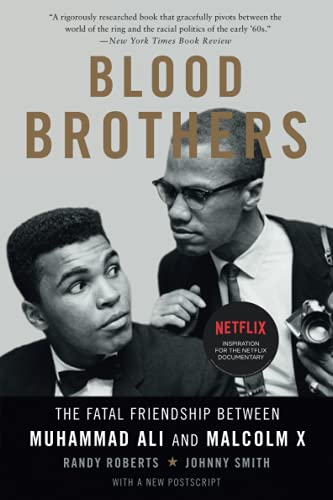
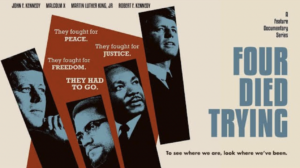


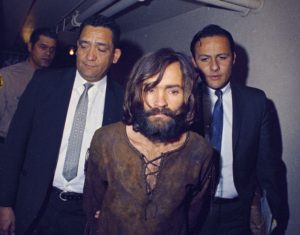
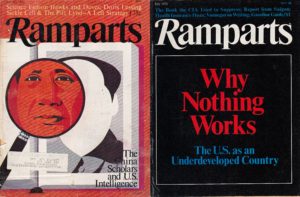
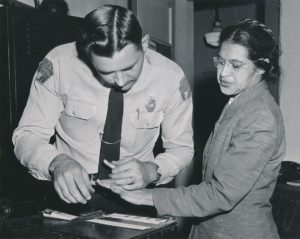
You need to be a supporter to comment.
There are currently no responses to this article.
Be the first to respond.